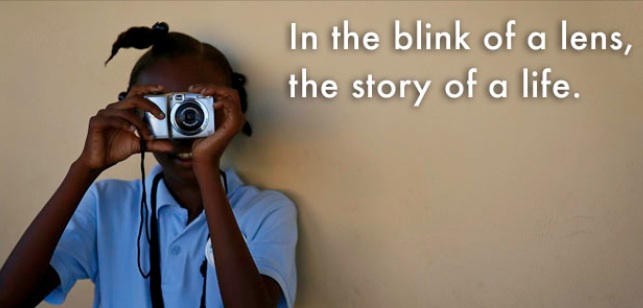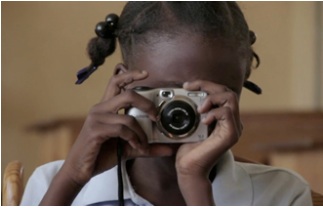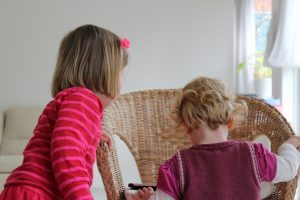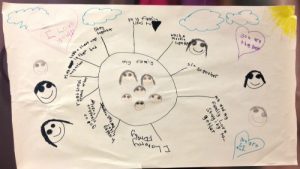
by Elizabeth Atalay | Oct 1, 2013 | 2013, Education, Eye on Culture, Hobby, Humanitarian, Kenya, Media, Social Good, World Moms Blog

The Founder of the View Finder Workshop describes her inspiration:
“I WAS WALKING THROUGH CITÉ SOLEIL, the largest slum in the Western Hemisphere located in Haiti, one of the poorest places on Earth. Trash littered the streets and dirty stagnant rainwater was often used as latrines. The sun pulsated directly overhead, bleaching the blue sky to a blinding white. Sweat droplets raced down my spine and pooled at my lower back. Children dressed in rags – or for some, in nothing at all – played a spirited game of soccer with a half-inflated ball. I snapped a picture of a group of rambunctious kids, only to have eager young hands grab at my camera to see the image captured on my screen.
The novelty of the reproduction faded and most darted off between the shanty houses. One remained, diligently pointing at each face on the screen, as if ticking them off in his head. He stopped at the last one. His own. He let out a burst of pure, innocent, giggling glee and scampered off. Alone, I realized that for people who have next to nothing, a mirror is an unattainable luxury. This child only met his reflection by process of elimination. For he knew which ones were his friends and which one was the stranger.
I was struck dumb. For I never realized a person could walk through life without knowing his own physical self. But photography can change that. It lets a child see himself & his world through different eyes. By learning tangible skills & creating new avenues of self-expression, he can contribute to his life & his community.
And thus, the seed for View Finder Workshop was planted.”
Babita Patel.
founder, humanitarian photographer – Excerpted from the View Finder website
From that moment View Finder Workshops were born. They were born to put the camera into the hands of children who have never had a lens through which to objectively view or portray the world in which they live. Children love taking photographs, and especially love taking, and seeing photos of themselves. These are not children growing up in a “selfie” obsessed culture, but kids who may not have ever even seen a mirror image of themselves. To put a camera in their hands proves liberating and empowering in a way that is hard to imagine, until you witness the pure joy on their faces when they see the images that they capture.
Photography as a visual medium provides a creative expression and ability to both view, and share a perspective from each child’s personal lens. And there is nothing like viewing the world through the eyes of a child.
The results of last January’s workshop in Haiti in collaboration with Respire Haiti, brought fresh views to the children of Gressier, Haiti who had been serving as restaveks (children enslaved as domestic servants), orphans & other vulnerable children. The images captured were often stark and beautiful. The photos were then exhibited in September in an LA gallery show in Santa Monica where gallery patrons were able to view the results of what the children were able to capture with a camera in their hands. A few of the kid’s prints even sold!
Next the Viewfinder Workshop is gearing up for a workshop in Kenya This fall, where they will be introducing photography to 40 students enrolled at their new school in the Lenana slum, in the country’s capital, in a program that they hope to make a sustainable curiculum. These programs need support to become sustainable, and this is where you can come in. You can like View Finder on Facebook , follow on Twitter , and/or make a donation to help other children to tell their story through images. You may just be the one to benefit from the enchanting worlds they share.

Have you ever put the camera in your own kids hands to see what they come up with?
This is an original post written for World Moms Blog by Elizabeth Atalay of documama.org.
*All photos credited to the View Finder Workshop website.

Elizabeth Atalay is a Digital Media Producer, Managing Editor at World Moms Network, and a Social Media Manager. She was a 2015 United Nations Foundation Social Good Fellow, and traveled to Ethiopia as an International Reporting Project New Media Fellow to report on newborn health in 2014. On her personal blog, Documama.org, she uses digital media as a new medium for her background as a documentarian. After having worked on Feature Films and Television series for FOX, NBC, MGM, Columbia Pictures, Warner Brothers, 20th Century Fox, and Castle Rock Pictures, she studied documentary filmmaking and anthropology earning a Masters degree in Media Studies from The New School in New York. Since becoming a Digital Media Producer she has worked on social media campaigns for non-profits such as Save The Children, WaterAid, ONE.org, UNICEF, United Nations Foundation, Edesia, World Pulse, American Heart Association, and The Gates Foundation. Her writing has also been featured on ONE.org, Johnson & Johnson’s BabyCenter.com, EnoughProject.org, GaviAlliance.org, and Worldmomsnetwork.com. Elizabeth has traveled to 70 countries around the world, most recently to Haiti with Artisan Business Network to visit artisans in partnership with Macy’s Heart of Haiti line, which provides sustainable income to Haitian artisans. Elizabeth lives in New England with her husband and four children.
More Posts

by Alison Fraser | Sep 24, 2013 | 2013, Africa, Canada, Childhood, Education, Eye on Culture, Family, Girls, Human Rights, Humanitarian, Humanity, Inspirational, International, ONE, Philanthropy, Poverty, Uncategorized, United Nations, Women's Rights, World Voice

City of Kitchener Councillor, Kelly Galloway-Sealock, and the author’s three daughters at a 2012 International Day of the Girl Child event
Mark your calendars and celebrate October 11th with your families and in your communities! Why you might ask? Well, the reasons are two-fold. Firstly, October 11th is Eleanor Roosevelt’s birthday. Eleanor was a world-renowned advocate for human rights and world peace. She was instrumental in the development and implementation of the Universal Declaration of Human Rights. So, how fitting is it that the United Nations has declared October 11th as the International Day of the Girl Child.
This October 11th marks the second annual International Day of the Girl Child. This day will be celebrated worldwide in an effort to bring attention to the human rights of girls around the world, and to highlight the gender-based struggles that so many young girls face daily.
Forced childhood marriages, rape, and female genital mutilation are just some of the issues that many little girls are forced to deal with at very early ages. In many countries, young girls are not valued and as a result are not invested in, particularly when it comes to schooling. The resulting long-term effects are alarming and have been documented in an eye-opening video by the Girl Effect movement. Please watch this video and share with friends and family – it will change the way you see the world. Girl Effect – the clock is ticking!
Last year, the focus of the very first International Day of the Girl Child was child marriage. This year, the focus will be on education. There are so many wonderful ways that you can participate in this important day. Whether you plan a family event or a community event, we all need to ensure that this very important day is recognized. Spread the word – girls are important and need to be valued, respected and treated as equal partners in our local and global communities.
What can you do to honour this important day? You can host a community screening of the Girl Rising film that is receiving acclaim worldwide. You can act to spread the word about struggles some young girls are facing in the world today. You can talk to your children about these critical issues. You can ask your child’s teacher to discuss this day with their class. You can organize a fundraising event in your office/workplace. Whatever you choose to do, whether it be large or small-scale, YOU can make a difference on October 11th!
Last year, my three young daughters tied pink ribbons in their hair and joined a local city councillor on a hike discussing the importance of human rights for all girls. It was a simple but highly effective way to celebrate this day. So many people asked them why they were wearing the ribbons, allowing them to speak about the day in their own words describing what it meant to them. It was so great to see the passion being shared by a younger generation, especially given that many of these issues are often difficult for them to understand and rationalize!
This year, we are planning a yoga event at a local studio for young boys and girls in the community. We are asking for small donations, which will then be used to support the educational needs of girls in Tanzania. In addition, my two older daughters have done small research projects on the significance of the International Day of the Girl Child, and will be presenting all that they have learned to their classmates on October 11th, thanks to the support of their teachers. I encourage you to plan an event too!Your event does not have to be fancy or sophisticated. Sometimes the smallest and simplest acts can have the greatest impact.
Let’s all celebrate October 11th together – girls are worth it!
As Eleanor Roosevelt once said;
“Where, after all, do universal human rights begin? In small places, close to home – so close and so small that they cannot be seen on any maps of the world. Yet they are the world of the individual person; the neighborhood he lives in; the school or college he attends; the factory, farm, or office where he works. Such are the places where every man, woman, and child seeks equal justice, equal opportunity, equal dignity without discrimination. Unless these rights have meaning there, they have little meaning anywhere. Without concerted citizen action to uphold them close to home, we shall look in vain for progress in the larger world.” – Eleanor Roosevelt
In what way might you celebrate the Day of The Girl Child?
This is an original World Moms Blog post written by Alison Fraser.
Alison Fraser is the mother of three young girls ranging in age from 5 to 9 years old. She lives with her family in Cambridge, Ontario, Canada. Alison works as an Environmental Toxicologist with a human environment consulting company and is an active member of the Society of Environmental Toxicology and Chemistry (SETAC). She is also the founder and director of the Canadian Not for Profit Organization, Mom2Mom Africa, which serves to fund the school fees of children and young women in rural Tanzania. Recently recognized and awarded a "Women of Waterloo Region" award, Alison is very involved in charitable events within her community including Christmas Toy and School Backpack Drives for the local foodbank.
More Posts - Website
Follow Me:



by World Moms Blog | Sep 16, 2013 | 2013, Adoption, Adoptive Parents, Africa, Being Thankful, Cultural Differences, Discipline, Ethiopia, Family, Guest Post, Health, Humanity, Humor, Inspirational, International, Kids, Motherhood, Multicultural, Netherlands, Parenting, Special Needs, Uncategorized, World Motherhood, Younger Children
 Sometimes I’m really weary of explaining. To grannies in the supermarket. To teenage girls at the playground. To fellow mums at school.
Sometimes I’m really weary of explaining. To grannies in the supermarket. To teenage girls at the playground. To fellow mums at school.
My daughter is clearly adopted, yes. She’s from Ethiopia, yes. She’s had a rough start, yes. She’s lost part of her eyesight, yes. And she’s got some countless more issues, yes.
But she’s still a four year old. And I’m her mother. I’m raising her my way. Just like I’m raising her big brother, who is blond and looks a bit too much like me.
The big difference between raising my daughter and raising my son, is that people seem to feel a kind of responsibility towards my girl. It feels like adopted children are in a way public.
I do understand how we stand out, in our not so worldly little town. We are getting used to the extra attention she brings with her, although I admit I have been thinking to teach her to growl when a stranger touches her hair and skin unasked.
We were prepared for all this. We knew we were going to feel like we have arrows flashing around our heads when taking her out. Now that she’s been with us for two years, we’ve all grown a thick skin, filled with humor. We have a series of catchy replies to go with all the ridiculous questions. The next one who dares to ask me what we feed her, will be answered ‘grass’, without even a blink.
But I still can’t really cope with all the unwanted ‘advice’ we get about raising her. When my son was little, I never ever had some stranger giving him candy or cookies. I never had to explain myself in the supermarket when I refused to let him take everything he wished for. And I certainly didn’t have to listen to people telling me how neglectful I was for letting him cry out a tantrum.
With my daughter, I do have those encounters. This one time in the supermarket, I was truly abashed. I had just taken away some nasty sugar bombs from my daughter’s hands and put them back, much against the little miss’s wishes. An elderly lady came over, took the candy and handed them over to my girl again. I was confused, believing she misunderstood. So I explained I didn’t want to buy that rubbish for her. At that moment she cursed me for being so horrible towards that poor little black girl that has been hungry all her life. She put the candy in my cart, ordered me to buy it, and took off while nodding her head.
At such encounters – yes, plural – I have the urge to scream.
For one thing. She’s NOT a poor little girl. She’s in most ways an ordinary four year old preschooler. She can throw the worst tantrums I ever witnessed, just because I can’t peel an apple while driving my car or because I can’t make the Easter bunny magically appear in August. The last one was about having only six colors of nail polish to choose from. Poor girl indeed.
But most importantly, I’M THE ONE raising that ‘poor little girl’. Of course we are aware of her issues, mostly the ones regarding attachment and anxieties. We try to give her everything she needs, truck loads of patience and care which unfortunately aren’t always replenished in time. But she doesn’t need everything she wants. Just like any other child doesn’t. Unless you plan to end up with a spoiled brat that demands a yellow sports car at age eighteen.
Spoiling her will not make right all the things she missed out in the first two years of her life. Maybe that sounds harsh and loveless, but I can assure you it isn’t meant that way. I cry with her when she mourns her lost heritage, when she is homesick. I’ve swallowed away rivers of tears all those times I had to explain her history to medical doctors and hospital professors.
But I can’t raise my daughter based on pity alone.
This is a first-time, guest contribution to World Moms Blog from our friend and mother of The Penguin and the Panther in Belgium, Katinka. Her Flemish blog is in transition over to an English-only blog. Stay posted to World Moms Blog for more from Katinka.
The photograph of the author’s daughter used in this post is credited to the author.
World Moms Blog is an award winning website which writes from over 30 countries on the topics of motherhood, culture, human rights and social good. Over 70 international contributors share their stories from around the globe, bonded by the common thread of motherhood and wanting a better world for their children.
World Moms Blog was listed by Forbes Woman as one of the "Best 100 Websites for Women 2012 & 2013" and also called a "must read" by the NY Times Motherlode in 2013. Our Senior Editor in India, Purnima Ramakrishnan, was awarded the BlogHer International Activist Award in 2013.
More Posts

by Olga Mecking | Sep 12, 2013 | Multicultural, Netherlands, Preschool, Technology, Uncategorized, World Moms Blog, World Motherhood
 I am raising digital natives and I love it. Technology is a big part of our lives. My brother-in-law once jokingly asked: “Is there a pen in this highly digitalized household?”
I am raising digital natives and I love it. Technology is a big part of our lives. My brother-in-law once jokingly asked: “Is there a pen in this highly digitalized household?”
“iPad” was among my now 2-year old’s first 50 words. When we Skype with my parents, sometimes my 4-year old gets tired and tries to swipe my father’s image away because she thinks that my laptop has a touchscreen.
There are many ways to approach digitalization. Some parents, bloggers and researchers focus on the negative impact digital technology (and technology in general) can have on our lives. They give tips on reducing screen time, warn against oversharing and treat technology as something that needs to be tightly controlled.
Others are amazed by the opportunities that technology offers us. They mention the community- building aspects of social media platforms, the opportunity to access information everywhere and at any time, and remark that our lives have been made much easier by digital technology.
Where do I stand on this? More in the technology-is-awesome camp.
As an expat, I appreciate the possibilities to not only hear my parents’ voices, but to also see them- and they can see the children. I can use my iPad to do yoga with the children, and to connect with them that way. We don’t have a TV, but instead we use our computers to watch TV series and movies, and read the news. I love taking pictures and I have a digital SLR. That way, I can take tons of photos to choose the very best. And I haven’t even touched on the great advantages I get from blogging. My hands rebel when I try to draw or paint, but my computer allows me to do just that.
I view technology as a tool that can be used to our advantage without taking control over our lives. I think that there is a time and place for everything. I love the term “digital natives”. Just as our children can teach us how to speak another language, we can learn to use all these wonderful devices and find delight in using them.
On the other hand, we can teach children to use technology and social media responsibly. I also think that we can teach them the world of paper books and sounds without a picture, and the world outside of the house rather than the world inside of their devices.
To me it is obvious that technology has much to offer in terms of education and play. But I believe that through technology we not only can connect with a device, but with our children (and grandchildren!) as well.
What is your approach to modern technology? Do you love it or hate it?
This is an original post to World Moms Blog from our writer and mother of two in the Netherlands, Olga Mecking.
The photograph used in this post was taken by the author.
Olga is a Polish woman living in the Netherlands with her German husband. She is a multilingual expat mom to three trilingual children (even though, theoretically, only one is trilingual since she's old enough to speak). She loves being an expat, exploring new cultures, learning languages, cooking and raising her children. Occasionally, Olga gives trainings in intercultural communication and works as a translator. Otherwise, you can find her sharing her experiences on her blog, The European Mama. Also take a while to visit her Facebook page .
More Posts - Website
Follow Me:




by Mama B (Saudi Arabia) | Sep 11, 2013 | 2013, Cultural Differences, Culture, Family, Family Travel, Grandparent, Home, Life Balance, Saudi Arabia, Uncategorized, World Motherhood
 The first week of school, after a two and a half month summer, is nearly over and we are slowly getting into the swing of things.
The first week of school, after a two and a half month summer, is nearly over and we are slowly getting into the swing of things.
I love the schedules, the school calendar, the time tables. The order of it all is just so… ahh… comforting! It only takes a short while before I start dreaming of our next break, but being back home is such a blessing.
There is a feeling I get when landing back in Riyadh, which is like sitting back in your favorite chair that has moulded its self to your body perfectly. Everything fits into the right place. It is an enormous relief, no matter how much fun we were having, to be back home where I know where everything is if I need it.
When I am traveling I feel totally disconnected. My life here revolves around my family – ‘my tribe’ as I call them. This is not only my ‘mini tribe’, consisting of my husband and children, but of my whole tribe of mother, father. sisters, sisters in law, brothers in law, cousins, aunts and uncles. It is a foreign feeling to be somewhere without the them for a long while.

Mama B’s a young mother of four beautiful children who leave her speechless in both, good ways and bad. She has been married for 9 years and has lived in London twice in her life. The first time was before marriage (for 4 years) and then again after marriage and kid number 2 (for almost 2 years). She is settled now in Riyadh, Saudi Arabia (or as settled as one can be while renovating a house).
Mama B loves writing and has been doing it since she could pick up a crayon. Then, for reasons beyond her comprehension, she did not study to become a writer, but instead took graphic design courses. Mama B writes about the challenges of raising children in this world, as it is, who are happy, confident, self reliant and productive without driving them (or herself) insane in the process.
Mama B also sheds some light on the life of Saudi, Muslim children but does not claim to be the voice of all mothers or children in Saudi. Just her little "tribe." She has a huge, beautiful, loving family of brothers and sisters that make her feel like she wants to give her kids a huge, loving family of brothers and sisters, but then is snapped out of it by one of her three monkeys screaming “Ya Maamaa” (Ya being the arabic word for ‘hey’). You can find Mama B writing at her blog, Ya Maamaa . She's also on Twitter @YaMaamaa.
More Posts

by hjunderway | Sep 9, 2013 | Culture, Expat Life, France, World Motherhood, Younger Children
 Two years ago, I said goodbye to the 100+ friends that had started off as co-workers and quit my job in preparation to leave the United States and move with my husband and son to Paris, France.
Two years ago, I said goodbye to the 100+ friends that had started off as co-workers and quit my job in preparation to leave the United States and move with my husband and son to Paris, France.
Working in the mental health field, where burnout rates are a true reality and there are constant shifts in schedules and treatment, we had a saying; “Change is hard.” We said this a thousand times to help solidify the “change” in our minds and to mentally prepare ourselves for the differences between the experiences we had before the transition and the ones we braced ourselves for afterwards.
Change is hard. Again my family is faced with major changes as our expatriate contract is unexpectedly ending and we are returning home to the United States. However this time, we are leaving with a four-year old who attends school daily, has friends, and identifies Paris as “home.” Our son speaks two languages, prefers baguette to sandwich bread, and thinks everyone has gouter at 4:00 p.m.
When we arrived in Paris, HJ was only two years old and to him, home was wherever his parents and toys were. We had to do very little to prepare him for the transition, but realizing that he is now a little person with thoughts and most importantly, feelings, preparation to move back to the United States will take on much more of a significance for us.
How do you prepare a young child for such a big change? Do you tell them months in advance, or do you wait until the week before? Do you play up the excitement of the move or downplay it to ease anxieties?
As a therapist, and most importantly, as a mother, I feel it truly depends on the child. For HJ, waiting approximately two weeks before the movers come to pack up our apartment for the overseas shipment will be the right time. For younger children, this might be too long of a time frame for them to understand and for older kids, who are more emotionally invested in their expatriate community, may need substantially more time to process.
My son doesn’t understand weeks or months yet. He knows “now,” “soon,” and “later.” So for him and for children who don’t understand time frames yet, parents can utilize a paper chain by simply cutting strips of colored paper and stapling them together to form a chain. Each link represents a day; link enough to cover the amount of time you have before the transition day arrives. For older kids, they can write something they are excited about or conversely, sad about the transition. Each day as you move closer towards the change, you can rip off a link in the chain, and kids can visually see the transition day as it approaches.
Once your time line has been established, the process of understanding the change can begin, which can be accomplished in a variety of ways. The first is through writing a social story; this is a story you can write in a basic word document that will outline the specifics of the upcoming change.
For our family, we’ll talk about returning home to America, feature photos of our home in the US as well as those of preferred family members. The focus will be on what things will change for our son when we leave. Including pictures of his new school and perhaps of the teachers who will be working with him will be helpful. We’ll also emphasize the fact that at school, his teachers and classmates will speak English, which is a huge change for our son. Another way to help prepare for the upcoming change is to have your child participate in packing, allowing them to feel like they have control over the change. For our son, this means having him pack his own suitcase of preferred clothing and toys.
The second thing is to, in essence, mourn the loss of the experience your child has had. Allowing them to share feelings of sadness and loss in regards to saying goodbye to friends they’ve made is an important part of the process. Depending on the age of your child or their emotional development, it may be helpful to purchase an address book, gathering mailing/email addresses, as well as Skype names. For close friends, planning Skype dates ahead of time can be helpful and gives kids something to look forward to.
Another way to embrace and remember the specifics of the current experience, it may be helpful to spend time seeing favorite places, gathering mementos, and taking lots of pictures. Using online software like Shutterfly, you can create photo books for children to look at if they are feeling sad after the transition.
Change is hard, and by sharing this process with my son, I’m hopeful that I too can prepare myself for the transition from France back to America!
Moms, what are some tips you might have to help moms like me help their children with changes and transitions?
This is an original post for World Moms Blog by Jacki of HJUnderway in Paris, France, who is preparing to move back to the United States with her husband and son, HJ, aged 4.
The photograph used in this post is credited to the author.
Jacki, or “MommaExpat,” as she’s known in the Internet community, is a former family therapist turned stay-at-home mom in Paris, France. Jacki is passionate about issues as they relate to mothers and children on both domestic and international scenes, and is a Volunteer Ambassador for the Fistula Foundation. In addition to training for her first half marathon, Jacki can be found learning French in Paris and researching her next big trip. Jacki blogs at H J Underway, a chronicle of her daily life as a non-French speaking mom in France.
More Posts




















